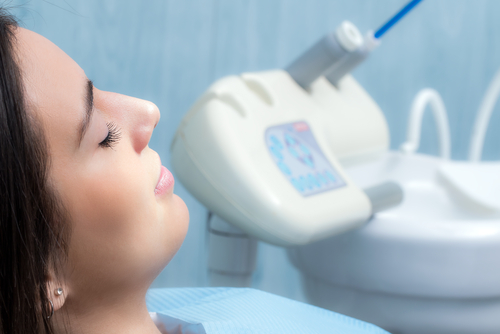Handling Dental Emergency Situations With Dental Anxiety
Dealing with dental emergencies can be a nerve-wracking experience, especially for individuals who suffer from dental anxiety. The fear of dental procedures combined with the urgency of a dental crisis can lead to heightened stress and panic.
At Northwind Dental, Dr. Dawson wants patients with dental phobia to know they’re in good hands at our Wasilla dental office. We’ll help you stay calm and reassured so you can get the emergency dentistry treatment you need.

What Is Dental Anxiety?
Dental anxiety, also known as dental phobia, is an intense and irrational fear of visiting the dentist or undergoing dental procedures. It can cause extreme distress and panic in individuals, often leading them to avoid dental visits altogether. This fear can be debilitating and may prevent individuals from seeking essential dental care, even when they’re experiencing dental issues or emergencies.
What Causes Dental Anxiety?
Several factors can contribute to the development of dental anxiety, including:
- Previous Negative Experience: A past traumatic or painful dental experience can leave a lasting impact on an individual, leading to dental anxiety.
- Fear of Pain: The fear of experiencing pain during dental treatments can trigger anxiety.
- Fear of Needles or Instruments: Some individuals may have a fear of dental needles, drills, or other instruments used during treatments.
- The Feeling of Helplessness: The feeling of being vulnerable or unable to control the situation during dental procedures can contribute to anxiety.
- Fear of Judgment: The fear of being judged for the condition of their teeth or oral health can also lead to dental anxiety.
Dental Anxiety Symptoms
Dental anxiety can manifest in various ways, and the symptoms may vary from person to person. Some common symptoms of dental anxiety include:
- Intense fear or apprehension
- Avoidance behavior
- Difficulty breathing
- Restlessness
- Sleep disturbances
- Nervousness and tension
- Feeling helpless
How to Face Dental Emergencies
Acknowledge Your Anxiety: Embrace Your Feelings
Dealing with dental anxiety during emergencies requires acknowledging and embracing your fears. It’s essential not to suppress your feelings but rather accept them as a natural response. Embracing your feelings allows you to work through them and take steps to manage your anxiety effectively.
Build a Trusting Relationship With Your Dentist: Communication is Key
Developing a trusting relationship with your dentist is crucial in alleviating dental anxiety. Find a dentist, like Dr. Dawson, with whom you feel comfortable and can openly communicate your fears and concerns. Sharing your dental anxiety with your dentist helps them understand your needs during emergencies. A dentist aware of your anxiety can provide additional support and reassurance throughout the process, making dental emergencies less daunting.
Educate Yourself: Knowledge is Empowering
Knowledge is empowering, especially when it comes to dental emergencies. Educate yourself about common dental problems that may lead to emergencies, such as toothaches, chipped teeth, or knocked-out teeth. Understanding the signs and symptoms of these issues allows you to identify them early on and take appropriate first-aid steps before seeking professional help. By knowing, you’ll feel more in control and better equipped to handle potential emergencies.
Prepare a Dental Emergency Kit: Be Prepared
Being prepared is essential in managing dental emergencies, and having a dental emergency kit on hand can provide a sense of security. Your kit should include items like gauze to control bleeding, a small container with a lid to preserve knocked-out teeth, pain relievers to manage discomfort, and your dentist’s contact information. Having these essentials readily available can make a significant difference during a dental crisis, allowing you to respond promptly and effectively.

Practice Relaxation Techniques: Calm Your Mind
Incorporating relaxation techniques into your daily routine can help with anxiety better. Deep breathing exercises, meditation, or yoga can significantly reduce stress and help calm your mind. These techniques can be particularly beneficial during dental emergencies, when dental phobia may escalate. Practice these relaxation methods regularly to familiarize yourself with the process, so they become second nature when you need them most.
Reach Out for Support: You’re Not Alone
Remember that you’re not alone in experiencing dental anxiety. Many people share similar feelings when faced with dental emergencies. Reach out to friends or family members who have encountered dental crises in the past. Their understanding and advice can be reassuring during stressful situations. Sharing experiences and coping strategies can help you feel more supported and less isolated during dental emergencies.
Schedule Regular Dental Check-ups: Preventive Care Matters
Prevention is crucial to reducing the likelihood of severe dental emergencies. Schedule regular dental check-ups with your dentist to maintain good oral health. These routine visits allow your dentist to identify potential dental issues early on, which can prevent them from escalating into emergencies. By staying proactive in your dental care, you can minimize the risk of facing urgent dental situations.
Focus on Distractions: Divert Your Attention
Distraction can be a powerful tool in managing dental anxiety during emergencies. When faced with a dental crisis, focus your attention elsewhere to alleviate dental phobia. Engage in activities that divert your mind, such as listening to soothing music or using visualization techniques. By occupying your thoughts with positive stimuli, you can ease anxiety and maintain a calm demeanor during dental emergencies.
Seek Professional Help for Dental Anxiety: Consider Sedation
If dental anxiety significantly affects your life and hinders your ability to cope with emergencies, don’t hesitate to seek professional help. Talk to your dentist about sedation options that may suit your needs during dental procedures, especially during emergencies. Sedation dentistry can provide a sense of relaxation and calmness, making dental treatments more manageable for individuals with dental anxiety.

Frequently Asked Questions
Yes, dental anxiety can be overcome with the right approach and support. While it may take time, individuals can gradually reduce their dental anxiety through various techniques and coping strategies. Practicing relaxation techniques, seeking professional help, and considering sedation options can also help individuals manage and overcome dental anxiety.
The best sedative for dental anxiety may vary depending on the individual’s level of anxiety and the specific dental procedure. The choice of sedative will depend on the individual’s medical history, the level of anxiety, and the complexity of the dental procedure. Dentists will carefully assess the patient’s needs and recommend the most appropriate sedative for their needs.
Yes, many dentists are trained to work with anxious patients. Look for those who offer sedation dentistry or advertise themselves as specializing in treating dental anxiety.
Yes, avoiding dental care due to phobia can result in neglected oral health, potentially leading to dental emergencies such as severe toothaches, infections, or abscesses.
Overcoming Dental Phobia During Dental Emergencies
Facing dental emergencies with dental anxiety may seem daunting, but with the right approach and preparation, it’s entirely manageable. Remember to utilize relaxation techniques and seek professional help if needed to manage dental anxiety effectively.
Dr. Dawson and our team will personalize your emergency dental treatment to meet your needs to ensure you get the care you need. Contact our Wasilla emergency dentist at (907) 373-2440 to learn more and schedule an appointment.
